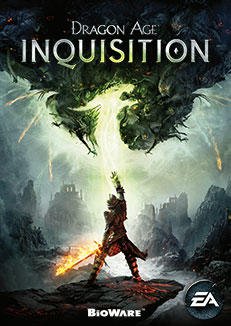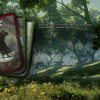Dragon Age: Inquisition is a role-playing game and the third main game in the Dragon Age series. It is set in the Thedas continent, the same fantasy world as the two previous games. It consist of two large countries: Ferelden (from Dragon Age: Origins) and Orlais, as well as the land inbetween. The story picks up after the events of the supplementary novels Dragon Age: Asunder and The Masked Empire describing a civil war in Orlais between the loyalists of the ruling Empress and a noble faction led by her cousin Grand Duke Gaspard. After the events of Dragon Age II the Circle of Magi has gone rogue and the mages are at war with the Templar Order seceded from the Chantry. The player’s character enters the game world from the Fade, a breach to another dimension caused by an explosion at a peace conference between mages and templars. Many clerics, including their leader the Divine, are killed and initially the player’s character is held responsible for that, as the only survivor to come out of the blast. The character has however no memory of what has happened, but discovers powers that are capable of closing rifts as is then referred to as the Herald of Andraste. The initial premise is to close these rifts, with the help of the former associates of the Divine, Cassandra and Leliana, former templar Cullen and ambassador Josephine. Following the Divine’s last orders they establish the Inquisition, an independent group to close the rifts and bring those behind it to justice.
True to the spirit of the series the character can be customized for appearance, sex, class and race. The available races are dwarf, elf, human, and Qunari and the classes are mage, rogue, and warrior with three specializations each. To grow the Inquisition experience needs to be earned by completing quests, which allows the player to further define allegiances and pursue romances. A custom party can be defined and each member benefits from experience as it opens up access to better weapons and more abilities. Power points open up new areas and Inquisition points define the influence over the region; each new level provides a perk that benefits the entire Inquisition. The main hub for quests is the Inquisition’s war table. The War Council consists of Cassandra (also available as a party member), as well as Cullen, Josephine and Leliana. The latter three advisers can be assigned tasks to complete on their own to progress, unlocking new characters, quests and areas.
The party of four travels to different regions, mainly with the main goal to close a rift and defeat a rival faction, but there are also many sidequests not related to the main story, along with the allegiance towards templars or mages which offers separate missions, and character quests to please specific characters, often for romantic purposes. Each main mission has a recommended level to start and there are multiple difficulty levels. For combat the game can be played as an action RPG, controlling one character while the AI handles the other three, or using a more tactical approach. In the tactical mode the game is paused and orders can be issued. There are also many more details for enemies shown then, such as the HP, strengths and weaknesses. By holding a button the action can be started and as soon as it is released the game pauses again. Even when approaching it an an action RPG you still define the abilities of the other party members through skill trees and you can guide their general approach, such as aggressive or rather relying on defense. Weapon and equipment management through an inventory is also present as well as crafting based on recipes.
Multiplayer is available for up to four players, working cooperatively with quests separate from the single-player game, a first for the series. It is linked through the single-player game setting as the party members act as agents for the Inquisition. Also entirely new to the series is the introduction of optional micropayments to speed up progress, through the acquisition of the Platinum currency. Unlocked or crafted items cannot be transferred between the two game modes.




